One of the most important accolades a player can win is the Most Valuable Player Award.

Since only one player is chosen for this award, there is steep competition for being the MVP of your team all season. Not to mention, the NBA is a league full of superstar players who all probably deserve the MVP Award over the course of 82 games. It takes that little bit extra in terms of performance, production, and winning to get a guy over the hump and capture the prestigious award.
Since 1955, the MVP Award has been awarded to the best single player over the regular season each and every year. Most often, although there are some disputes, the MVP award is awarded to both the best player in the league that year along with who provided the most value to their team. Without these guys on their respective teams, the team would not be as successful as they did.
We have witnessed some incredible MVP seasons, including record-breaking circumstances and production. But which players have managed to win the most MVP awards per position? The NBA is now a positionless game and there really isn’t a set category as to what players should do at a specific moment, but historically, there has been. It is time to uncover the MVP winners per position, and who did it best. Some names are familiar, but there is steep competition in one particular position in terms of MVP award winners.
Point Guard – Magic Johnson
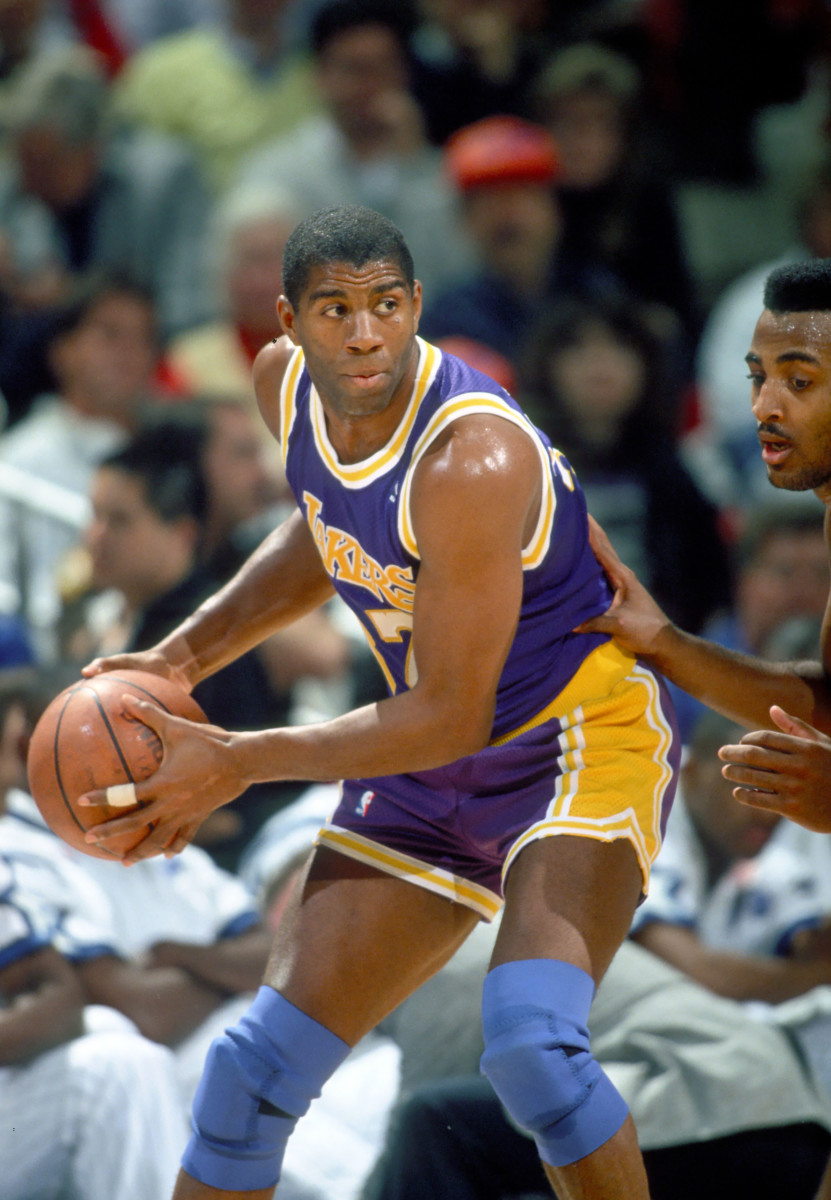
Credit: RVR Photos-USA TODAY Sports
MVP Awards – 3 (1987, 1989, 1990)
Just as we will see across the board in this article, Magic is the historically best player at his position where the most MVPs were won. No point guard has come close to what the Lakers legend has done in terms of winning, playmaking, and floor leadership. We have seen scoring point guards come and go, but none can compare to what Magic Johnson has done. Overall, Johnson has won a whopping three MVP awards over his career.
His first came in 1987 when he dropped 23.9 PPG, 6.3 RPG, 12.2 APG, 1.7 SPG, and 0.5 BPG on 52.2% shooting from the field. Amazingly, his first MVP victory came after winning his first two championships. Of course, Johnson would win his third NBA title at the end of 1987 as well. The Lakers went as Magic went, finishing 65-17 and holding the best record in the NBA. As we have seen historically, the best player on the best team has the best chance to win the MVP award and that was the case for Magic Johnson.
The greatest point guard ever won his second MVP award in 1989 when he averaged 22.5 PPG, 7.9 RPG, and 12.8 APG 50.9% from the field and a league-leading 90.9% from the free-throw line. Johnson was showcasing how great he can be on offense, and his accuracy from the strip was phenomenal all year long despite getting to the line on average 3-4 times per game. The Lakers held an impressive 57-25 record which topped the West and was only second to the eventual champion Detroit Pistons. With his second MVP award, Magic was breaking new ground and his trifecta of accolades would be completed in the following season.
His last MVP victory came in 1990 when he finished 2nd in APG behind John Stockton, 18th in scoring, and 17th in steals. The legendary point guard was one of the greatest talents the league had seen and was the architect of the magical “Showtime” Lakers. Johnson was not able to capitalize on a great season with a championship, but he was still able to win his 3rd MVP award and would not add another title to his 5 rings.
Shooting Guard – Michael Jordan
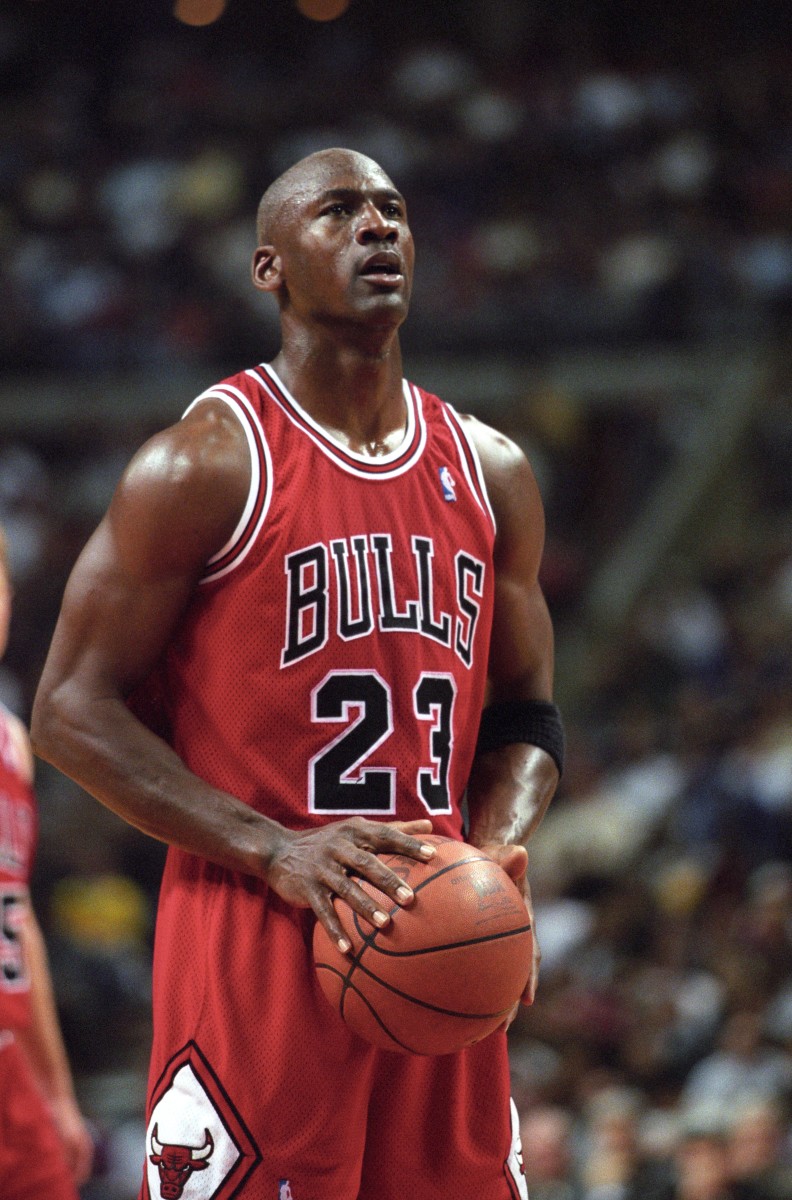
Credit: Matthew Emmons-USA TODAY Sports
MVP Awards – 5 (1988, 1991, 1992, 1996, 1998)
Michael Jordan is the greatest player of all time, do not let anyone fool you. The GOAT famously leads all shooting guards with 5 MVP awards, and he managed to do it despite finishing second 4 times in his illustrious career. Quite frankly, it would have been correct to give MJ the MVP award every season of his prime because he was the best player in the world and the greatest talent on his team.
Jordan’s first MVP award came in 1988 in what can be described as one of the best regular-season campaigns in NBA history. Jordan posted averages of 35 PPG, 5.5 RPG, 5.8 APG, and 3.2 SPG on 53.5% was a career-high. Putting up these numbers with that type of efficiency was almost unprecedented from a perimeter player. Michael won his first MVP Award, made his first NBA All-Defensive First Team, and won his only Defensive Player of the Year Award.
He won back-to-back MVP awards in 1991 and 1992, the years in which he won his first two MVP awards. The superstar shooting guard averaged 31.5 PPG in the regular season in 1991, winning his 5th straight scoring title and eventually winning the championship at the end of the year. In 1992, Jordan posted 30.1 PPG to win the scoring title and make All-Defensive and All-NBA First Team honors. No doubt, he deserved those back-to-back MVPs.
His fourth MVP award came in 1996 when Jordan returned full-time back to the NBA following his retirement. Michael Jordan averaged 30.4 points per game while shooting 49.5% from the field in 1996. The guard quickly assumed the title of finest player in the world after winning his eighth scoring championship in his ninth season. No doubt, Mike was the man for the Chicago Bulls again.
Finally, his fifth MVP award came in 1998 when Michael Jordan once again became on top by winning his 10th scoring title for the 62-20 Chicago Bulls. As expected, the Bulls had the best record in the East while also tying the Utah Jazz in terms of the best record in the entire league. Jordan’s dominance was on full display, posting 28.7 PPG on 46.5% shooting from the field. Even if Karl Malone led the league in win shares (16.4), Jordan’s Bulls were a more attractive team thanks to the shooting guard’s elite two-way play.
Small Forward – LeBron James
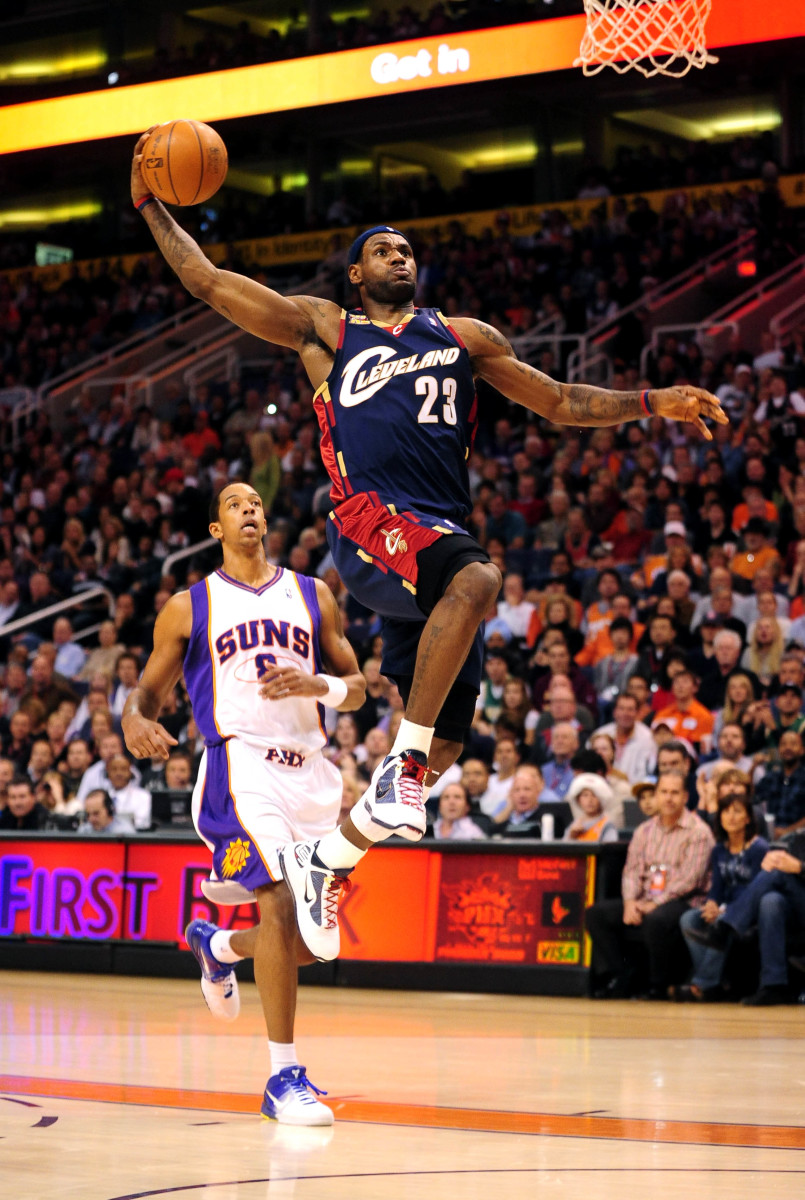
Credit: Mark J. Rebilas-USA TODAY Sports
MVP Awards – 4 (2009, 2010, 2012, 2013)
LeBron James was unlucky not to have more because he suffered from being too physically and athletically dominant in the regular season for modern voters. Similar to what Shaquille O’Neal and Wilt Chamberlain went through, LeBron was simply on a higher level when it came to athleticism and he was also an elite passing and scoring forward. Due to his greatness as an all-around basketball player, the NBA had to spread the wealth and offer the likes of Kevin Durant and Derrick Rose MVP Awards at the expense of LeBron.
But winning 4 MVP awards does signify that The King was the best player of his generation, and he was certainly exceptional in two back-to-back seasons with the Cleveland Cavaliers and Miami Heat. Remember, LeBron is the only man to usurp what Larry Bird did during the 1980s as a small forward, and that is an achievement in and of itself.
His first back-to-back MVP awards came in 2009 and 2010 when he averaged 28.4 PPG, 7.6 RPG, and 7.2 APG on 48.9% from the field and 34.4% from three. Due to his dominance as a triple-double threat, James led the Cavaliers to a solid 66-16 record as they made it to the Eastern Conference Finals at the end of the year. James posted 29.7 PPG, 7.3 RPG, and 8.6 APG in 2010, finishing with 61 wins for Mike Brown’s Cavaliers side. No doubt, LeBron was a spectacular regular-season performer as Kobe Bryant was winning championships.
A season after he joined the Miami Heat in 2011, he won back-to-back MVP awards again. The King was special in 2012, averaging 27.1 PPG, 7.9 RPG, and 6.2 APG in the season following the disastrous exit from the NBA Finals at the hands of Dirk Nowitzki and the Dallas Mavericks. LeBron embraced the villain role and never looked back, eventually forming one of the best careers ever. James managed his final MVP trophy in 2013, posting 26.8 PPG, 8.0 RPG, and 7.3 APG on 56.5% from the field. With four MVP awards to his name, LeBron is the greatest small forward ever.
Power Forward – Tied (Giannis Antetokounmpo, Tim Duncan, Karl Malone, Bob Pettit)
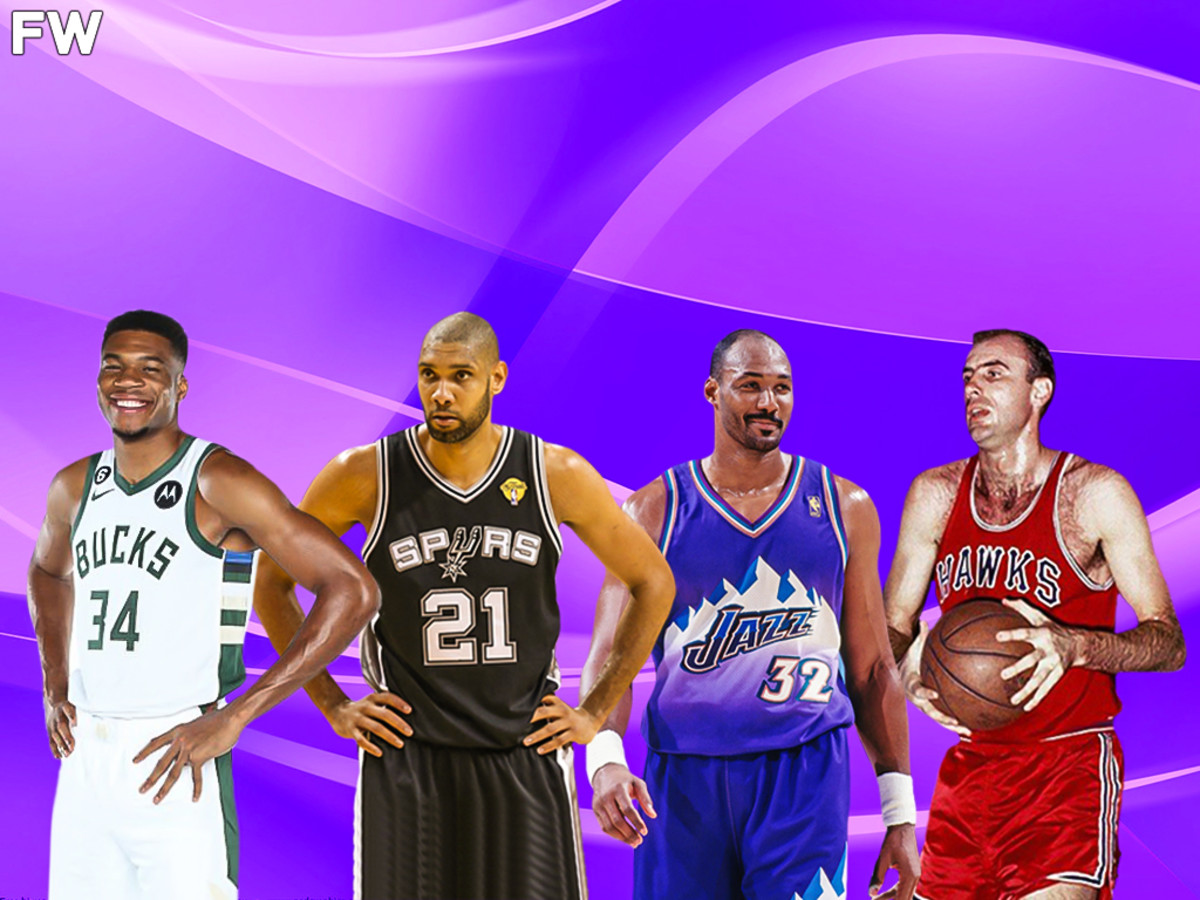
Credit: Fadeaway World
MVP Awards – Giannis Antetokounmpo (2019, 2020), Tim Duncan (2002, 2003), Karl Malone (1997, 1999), Bob Pettit (1956, 1959)
Giannis Antetokounmpo is the latest power forward to capture his second MVP award, and it came in the 2020 season that was marred by the coronavirus. The Greek Freak started becoming the best player in the world in 2019, posting 27.7 PPG, 12.5 RPG, and 5.9 APG for the Milwaukee Bucks. Of course, the Bucks finished with the best record in the East and did it again in 2020 with the best record in the conference. Giannis posted 29.5 PPG, 13.6 RPG, and 5.6 APG during the year and has a legitimate chance to lead all power forwards with a third MVP soon because he is only 28 years old.
Tim Duncan was a power forward who won back-to-back MVPs in 2002 and 2003 as a member of the San Antonio Spurs. Realistically, he might have won more because he was one of the best players in the NBA by his rookie season. He also finished second in MVP races quite a few times and was always in the running for the coveted award for the majority of his prime. Luckily for Duncan, he is still regarded as the greatest power forward who has ever lived until this day.
Karl Malone managed two MVP awards as a member of the Utah Jazz, even though the first one probably should have gone to Michael Jordan. It is widely speculated that the NBA decided against giving the award to Mike because he already had enough MVP awards and it was obvious he would win another one eventually. Regardless, Malone managed two MVP awards with his best MVP season coming in 1997 when he dropped 27.4 PPG, 9.9 RPG, and 4.5 APG on 55.0% shooting from the field.
Bob Pettit, the best of the 1950s, must be hailed as one of the most dominant players in his era. Standing 6’9” and weighing 205 lbs, Pettit was a beast inside the paint and his muscle-bound physique never failed to impact the game. He won two MVP awards in the 1950s, the first coming in 1956. The big man posted a league-leading 25.7 PPG and 16.2 RPG in only his second season, leading the St. Louis Hawks to 3rd in the NBA Western Division. In 1959, Pettit averaged 29.2 PPG to once again lead the league in scoring and chipped in 16.4 RPG as well.
Center – Kareem Abdul-Jabbar
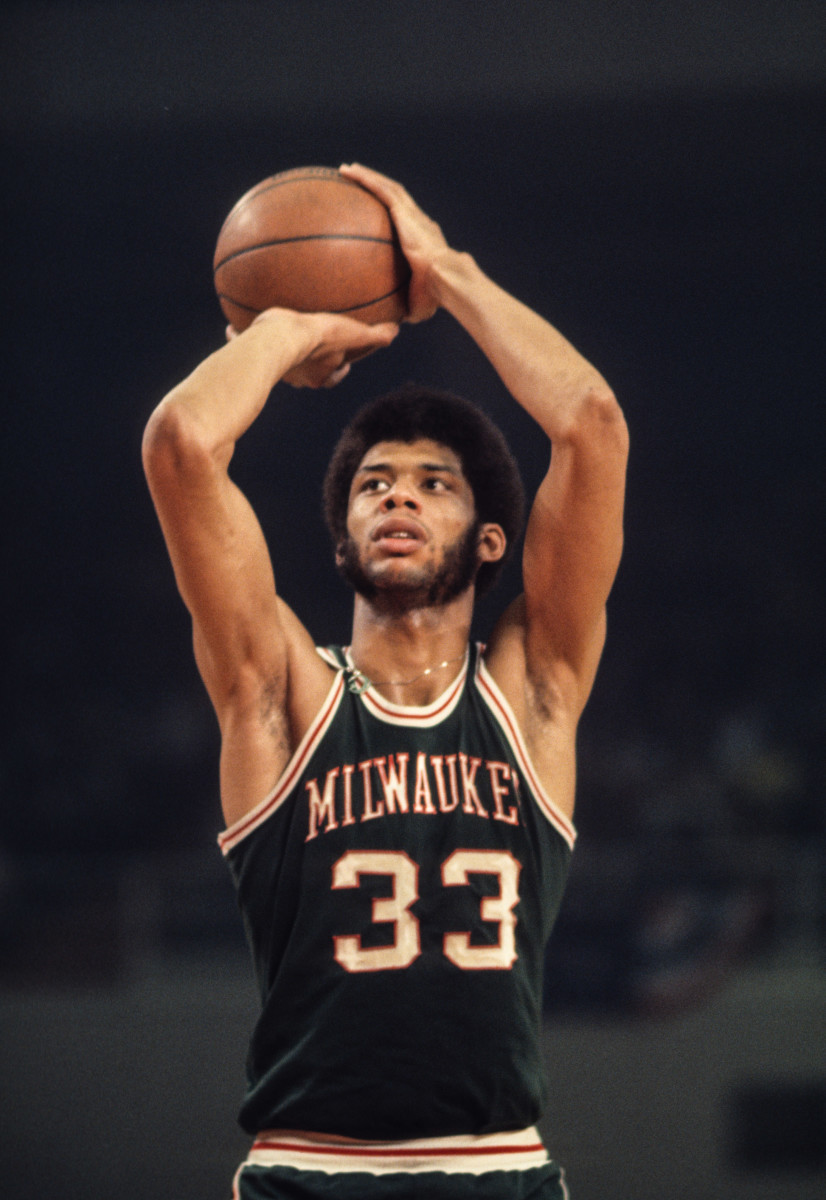
Credit: Malcolm Emmons – USA TODAY Sports
MVP Awards – 6 (1971, 1972, 1974, 1976, 1977, 1980)
Kareem deserves all six of his MVP Awards because he was the most dominant superstar in the NBA on both ends of the floor. Kareem has the unstoppable and unblockable sky-hook shot on offense and was also one of the greatest defensive centers ever. We have yet to see a center with the type of longevity and dominance that Kareem exhibited over his career. Quite frankly, Kareem is the greatest center to have ever lived in terms of accolades.
Abdul-Jabbar won back-to-back MVPs, starting in 1971 in one of the best seasons ever. In only his second season, Kareem led the NBA in scoring, win shares, and also won the coveted MVP award. Kareem and his sky hook shot were simply devastating because no team could stop the player when he was down low. The Bucks ended up sweeping the Bullets in the NBA Finals which capped off an all-time great MVP season by Abdul-Jabbar. In 1972, Kareem won the MVP award by posting an unbelievable 34.8 PPG which led the NBA and also carried the Milwaukee Bucks to a solid 63-19 record which was good enough to boost the team to the Western Conference Finals.
Kareem had to wait two more years until 1974 when he averaged 27.0 PPG, 14.5 RPG, 4.8 APG, and 3.5 BPG. Kareem’s stat line during the 1974 season was incredibly complete, especially since the center was required to do so much. Whether scoring, blocking shots, or rebounding, Kareem did it all. As expected, Kareem won his third MVP award, finishing first ahead of Bob McAdoo.
In 1976 and 1977, Abdu-Jabbar won back-to-back MVP awards to earn him his fourth and fifth MVP trophies. In the 1975–76 NBA season, Kareem Abdul-Jabbar won his first rebounding title, led the league in blocks, and by the end of the year, had established himself as one of the all-time greats. That results in an exceptionally prosperous season, one that Abdul-Jabbar would even acknowledge as one of his best ever on defense.
The center’s 1976-77 campaign saw him win yet another MVP award as he led the NBA in win shares. The Lakers finished with the first seed in the Western Conference and made it to the Western Conference Finals although it was a losing effort. Kareem was dominating the scoring charts and even in rebounding and defense on an individual level in the 1970s.
Kareem’s final MVP season came in 1980. The center played 82 games following the addition of rookie Magic Johnson, and the Lakers won the championship at the end of the year. The center was spectacular in the regular season, averaging 24.8 PPG, 10.8 RPG, 4.5 APG, and 3.4 BPG while shooting 60.4% from the field. Magic earned Finals MVP honors at the end of the year, but Abdul-Jabbar solidified himself as the best center ever by the 1980 season.
Source: fadeawayworld








